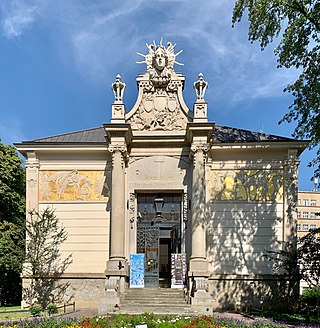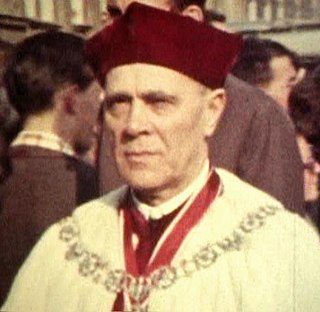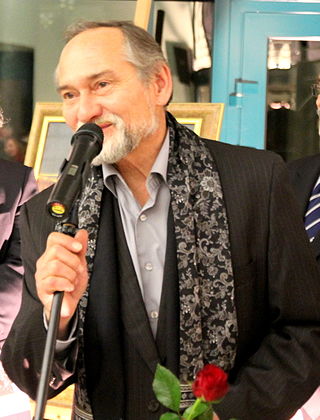
Gabriela Matuszek-Stec (born 31 December 1953 in Jaworzno) is a Polish literary historian, essayist, critic and translator of German literature.

Gabriela Matuszek-Stec (born 31 December 1953 in Jaworzno) is a Polish literary historian, essayist, critic and translator of German literature.
Matuszek-Stec [1] is a professor of Polish Studies at the Jagiellonian University in Krakow, specializing in the literature of the 19th and 20th century - primarily with Stanisław Przybyszewski, the naturalistic drama and modern prose, Polish-German literature associations and literary translation. From 1983 to 1987 she lectured on Polish literature at the Humboldt University of Berlin, there was a visiting professor (2004 and 2006), as in Jena, Cologne, Leipzig, Vienna, Grenoble and Prague.
She received a scholarship of scientific and literary foundations, including German Schiller Society in Marbach am Neckar (1995, 1996), the Academy of Literature in Ranis (2002), the International Writers and Translators Center of Rhodes (2002), the Baltic Centre for Writers and Translators, Gotland (2003). Since 1992 she has been a member of the Societas Jablonoviana in Leipzig.
She is the founder and director of the first "Polish Literature Institute" (Studium Literacko-Artystycznego). From 2005 to 2008 she was Vice-President, then to 2014 President of the Krakow branch of the Polish Writers' Union SPP since 2014 Member of the Board. Since 2007, Gabriela Matuszek editor of the literary magazine Studium and the "Krakow Library of the Polish Writers' Association" (since 2009). [2] Matuszek was a participant of the German-Polish poets steamer and the German-Polish poetry festivals “word lust“ in Lublin and is part of the close vicinity of this group of authors. [3] She is married to the Polish painter Grzegorz Stec.

Young Poland was a modernist period in Polish visual arts, literature and music, covering roughly the years between 1890 and 1918. It was a result of strong aesthetic opposition to the earlier ideas of Positivism. Young Poland promoted trends of decadence, neo-romanticism, symbolism, Impressionism.

Maria Gabriela Stefania Korwin-Piotrowska (1857–1921), known as Gabriela Zapolska, was a Polish novelist, playwright, naturalist writer, feuilletonist, theatre critic and stage actress. Zapolska wrote 41 plays, 23 novels, 177 short stories, 252 works of journalism, one film script, and over 1,500 letters.

Stanisław Zaremba was a Polish mathematician and engineer. His research in partial differential equations, applied mathematics and classical analysis, particularly on harmonic functions, gained him a wide recognition. He was one of the mathematicians who contributed to the success of the Polish School of Mathematics through his teaching and organizational skills as well as through his research. Apart from his research works, Zaremba wrote many university textbooks and monographies.

Stańczyk was the most famous Polish court jester. He was employed by three Polish kings: Alexander, Sigismund the Old and Sigismund Augustus.

Paweł Kubisz was a Polish poet, writer, journalist, and activist. He was one of the most important poets from the Trans-Olza region of Cieszyn Silesia.

Życie was an illustrated weekly established in 1897 and published in Kraków and Lwów in the Austrian partition of Poland. Founded by Ludwik Szczepański, with time it became one of the most popular Polish literary and artistic journals. Although short-lasting, it shaped an entire generation of Polish artists and art critics, notably those associated with the so-called Young Poland.
Adam Redzik is a Polish lawyer and historian, a professor at the Warsaw University. He specializes in the history of law and science.
Rafał Syska is a Polish film historian and associate professor in the Audiovisual Arts Department of Jagiellonian University in Cracow. First he was specialized in the phenomenon of violence in cinema, then he focused on strategies of authorship in American cinema and contemporary minimalistic slow-cinema, especially its neomodernism tendencies (e.g. works of Theo Angelopoulos, Alexander Sokurov, Béla Tarr, Bruno Dumont, Sarunas Bartas, Fred Kelemen, Tsai Ming-liang, Lisandro Alonso, Carlos Reygadas. Now he specializes in cinematic and narrative museology and exhibition studies.
Cezary Wodziński was a Polish philosopher, historian of philosophy, essayist, translator, and writer. He was a lecturer at Jagiellonian University in Cracow (Poland) and at the University of Warsaw (Poland).

Leon Tochowicz was a Polish internist and cardiologist.
The Battle of Drohiczyn took place in 1194 near the village of Drohiczyn between the allied Yotvingian and Kievan Rus' forces that raised Polish Rebels against the opposing Kingdom of Poland army led by Duke Casimir II the Just. The Polish army won the battle.

The Sermon of Piotr Skarga or Skarga's Sermon is a large oil painting by Jan Matejko, finished in 1864, now in the National Museum, Warsaw in Poland. It depicts a sermon on political matters by the Jesuit priest Piotr Skarga, a chief figure of the Counter Reformation in Poland, where he rebukes the Polish elite for neglecting the national interest.

Grzegorz Stec is a Polish painter, graphic artist and poet.

Tomasz Młynarski is a Polish political scientist and the former ambassador to France (2017–2022).

Stanisław Marian Waltoś is a Polish legal scholar and academic specializing in criminal law and legal history, professor of legal sciences, member of the Polish Academy of Sciences and the Polish Academy of Learning, professor of the Jagiellonian University, who was Head of the Department of Criminal Proceedings at the Faculty of Law of the Jagiellonian University from 1974, as well as the director of the Jagiellonian University Museum between 1977 and 2011.
Jan Muscenius, was a Polish astronomer, theologian, and the rector of Kraków Academy.

Blind Veit Stoss with his granddaughter is an oil painting by Jan Matejko painted in 1865. It belongs to the collection of the National Museum in Warsaw.

The State Literary Award was a Polish literature award during the interwar period. It was awarded starting in 1925 for a work published in the previous three years. The award was given by a five-person jury, consisting of three representatives from the largest creative unions, a critic, and a representative of the ministry, all chosen by the current Minister of Religious Affairs and Public Education.

A Strong Man is a 1929 Polish psychological thriller directed by Henryk Szaro and produced by Marek Libkow. It is the second adaptation of Stanisław Przybyszewski's 1912 novel of the same name. As one of the last Polish silent films, it presents a study of an artist who ultimately loses a battle with his own conscience.